Whether you are just starting to explore careers or reconsidering your options, it is critical to make the right decisions based on all the information at your fingertips. The JCE Sample Report is one important resource that can start you on a path to finding a rewarding and satisfying career.
When reviewing your JCE report, it’s important to understand that:
- Results only provide information about your interests – they do not indicate whether you have the ability, skill, personality, or education necessary to do a particular line of work.
- The report was designed as a self-help tool to guide you in choosing a career that matches your interests. Treat your results as a starting point for career exploration.
- Use other information to help you make career decisions (e.g., experience, skills, knowledge, talents, values, personal characteristics, and previous performance).
- Your interests can also be fulfilled outside of your job, through hobbies, community activities, family, education, and volunteer work.
- A trusted counselor or advisor can help you integrate the information in this report with other sources, and can provide additional guidance and local resources.
- You are encouraged to find out more about the specific occupations and fields that interest you, such as job descriptions, work environments, education requirements, and labor market information.

JCE Sample Report Contents
- Page 2 – Basic Interests
- Page 3 – Work Personality Scores
- Page 4 – Education Groups
- Page 5 – Job Groups
- Page 6 – Top 3 Job Groups
- Page 13 – Summary
- Page 14 – Exploring My Options
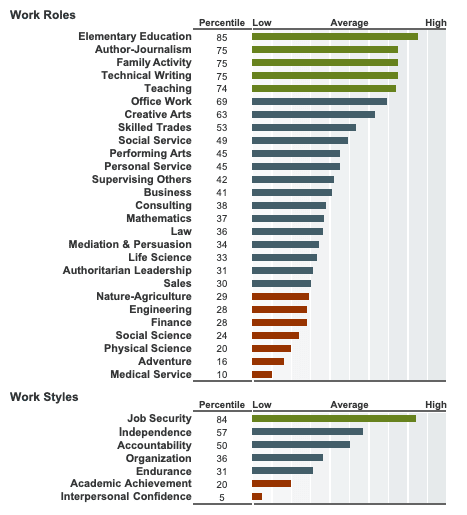
The Basic Interests represent your areas of interest and your preferences for 34 work roles and work styles. Work roles describe preferences for activities associated with certain occupations. Work styles describe preferences for certain types of work environments. All 34 Basic Interests are described in detail in Appendix A.
Use your list of Basic Interests to learn what types of job-related activities you would most enjoy and what types of activities aren’t very interesting to you.
Longer bars indicate your strongest interests and shorter bars indicate low interests. Your percentile scores reflect how your interests compare with the interests of other people who have taken the JCE. They represent the percentage of people who scored lower than you did on that interest. Note that males and females sometimes show different interest patterns. To see how your results compare to scores from people of your own gender, see the Detailed Scoring Information at the end of the report.
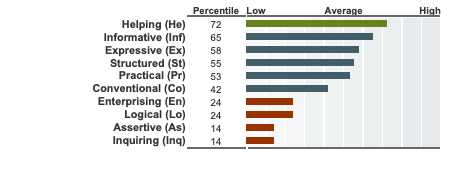
The Work Personality Scores reflect general patterns of interest that can be used to understand more about your personal work characteristics, work style, and preferred work environment. The 10 Work Personality Scores are described in detail in Appendix B.
Use your results on these Work Personality Scores to help you better understand yourself and refine your career planning.
Longer bars indicate strong preferences for how you like to do things and approach your work. Shorter bars indicate preferences and approaches that are uncharacteristic of you. Your percentile scores reflect how your interests compare with the interests of other people who have taken the JCE. They represent the percentage of people who scored lower than you did on that work personality. Note that males and females sometimes show different interest patterns. To see how your results compare to scores from people of your own gender, see the Detailed Scoring Information at the end of the report.
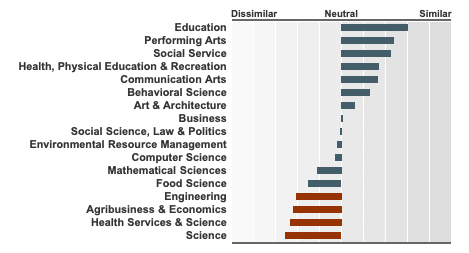
Your ranking of Education Groups was determined by comparing your entire pattern of 34 Basic Interests to the interest patterns of university students enrolled in the education programs associated with each of the 17 groups.
Use your Education Groups rankings to determine what education programs might interest you the most, as well as those you may not enjoy.
A positive score indicates that your pattern of interests is similar to the profiles of university students in the Education Group, while a negative score indicates dissimilarity. Sample college education and training programs for your high interest Education Groups are listed below.
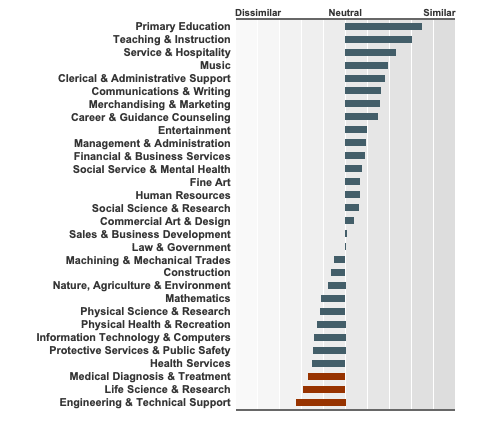
Your entire Basic Interest profile was compared to the interests of people working in 30 different Job Groups and the degree of similarity is ranked below. Scores indicate your probable interest and satisfaction with jobs in each group; they do not tell you whether or not you will be successful in any particular field or job. Additional details on your Top 3
Job Groups can be found on the following pages. All 30 Job Groups are described in detail in Appendix C.
Use your Job Group rankings to identify careers or sectors that you would enjoy and those that you may want to avoid.
A positive score indicates that your pattern of interests is similar to the profiles of people working in these areas, while a negative score indicates dissimilarity.
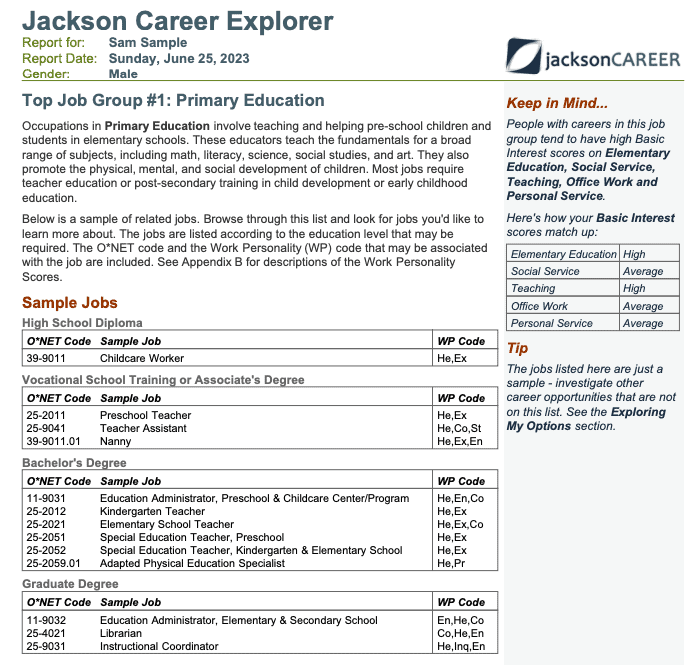
These pages break down the top 3 Job Groups that indicate interest and job satisfaction. These pages also present a sample list of related jobs and professional associations.
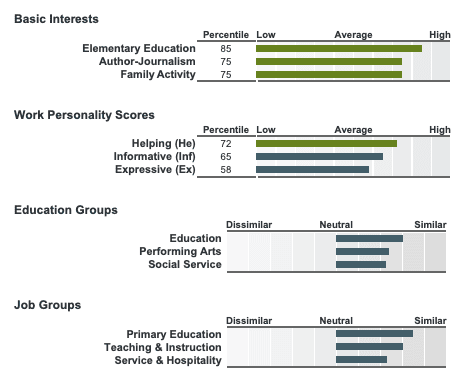
This page summarizes the JCE’s results, including the top 3 Basic Interests, top 3 Work Personality Scores, top 3 Education Groups, and top 3 Job Groups.
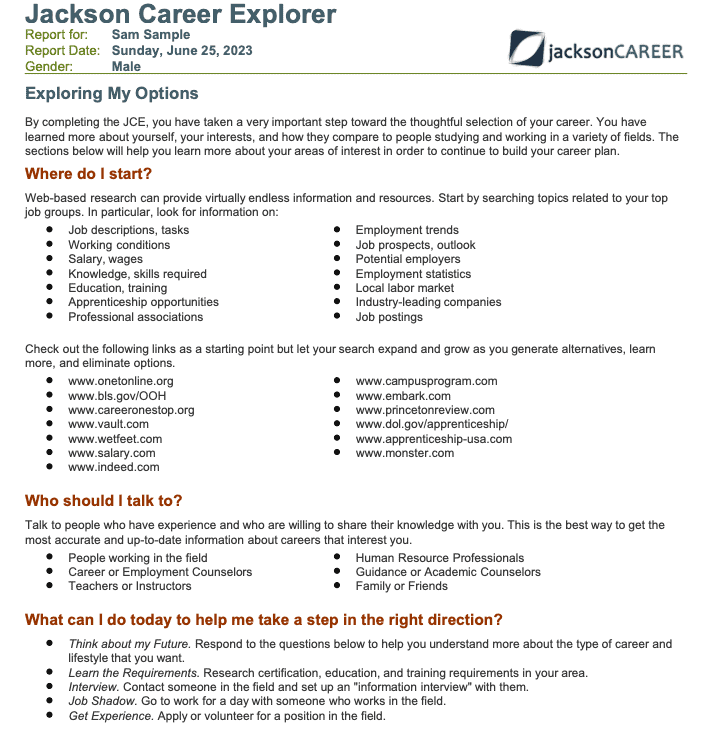
By completing the JCE, you have taken a very important step toward the thoughtful selection of your career. You have learned more about yourself, your interests, and how they compare to people studying and working in a variety of fields. The following sections will help you learn more about your areas of interest in order to continue to build your career plan.
Ready to Administer the JCE?
To gain access to a customized version of this report and more, order the JCE online today or contact SIGMA to find out more about our science-based and evidence-supported career assessments.